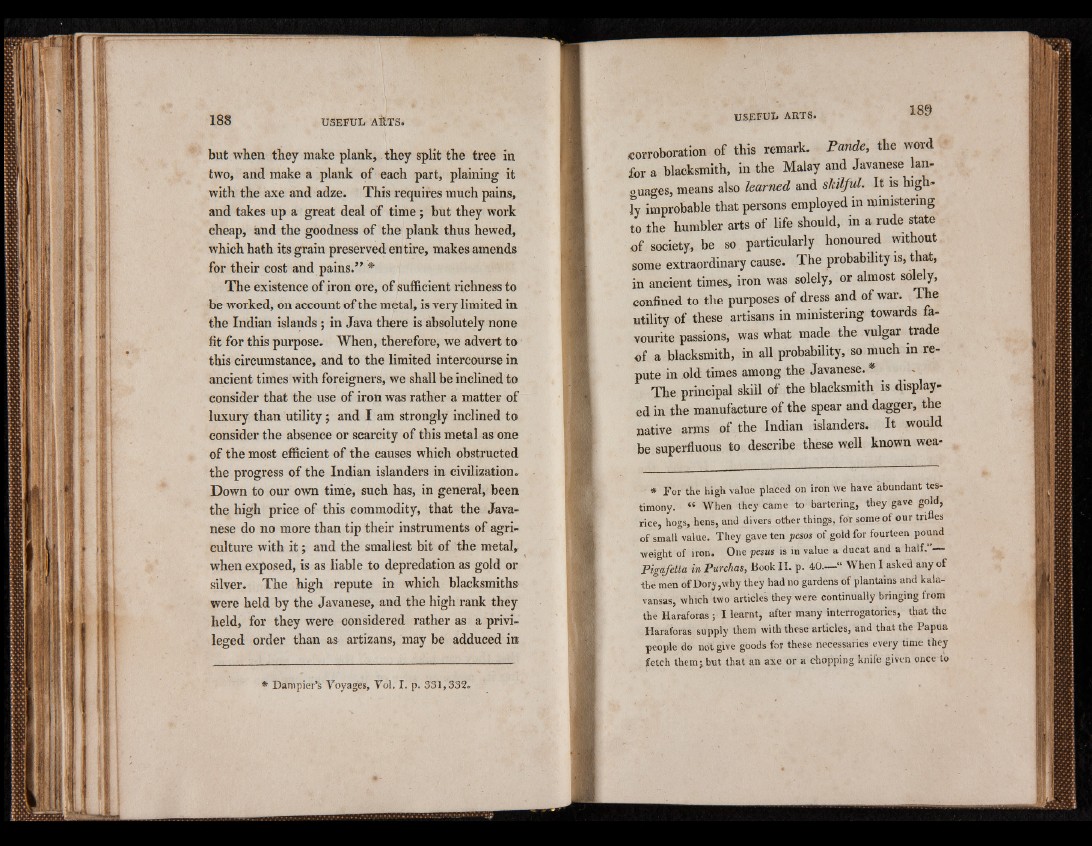
but when they make plank, they split the tree in
two, and make a plank of each part, plaining it
with the axe and adze. This requires much pains,
and takes up a great deal of time ; but they work
cheap, and the goodness of the plank thus hewed,
which hath its grain preserved entire, makes amends
for their cost and pains/’ *
The existence of iron ore, of sufficient richness to
be worked, on account of the metal, is very limited in
the Indian islands; in Java there is absolutely none
fit for this purpose. When, therefore, we advert to
this circumstance, and to the limited intercourse in
ancient times with foreigners, we shall be inclined to
consider that the use of iron was rather a matter of
luxury than utility; and I am strongly inclined to
consider the absence or scarcity of this metal as one
of the most efficient of the causes which obstructed
the progress of the Indian islanders in civilization.
Down to our own time, such has, in general, been
the high price of this commodity, that the Javanese
do no more than tip their instruments of agriculture
with i t ; and the smallest bit of the metal,
when exposed, is as liable to depredation as gold or
silver. The high repute in which blacksmiths
were held by the Javanese, and the high rank they
held, for they were considered rather as a privileged
order than as artizans, may be adduced in
* Dampier’s Voyages, Vol, I. p. 331,332.
corroboration of this remark. Pande, the word
for a blacksmith, in the Malay and Javanese lan-
ouages, means also learned and skilful. It is highly
improbable that persons employed in ministering
to the humbler arts of life should, in a rude state
of society, be so particularly honoured without
some extraordinary cause. The probability is, that,
in ancient times, iron was solely, or almost solely,
confined to the purposes of dress and of war. The
utility of these artisans in ministering towards favourite
passions, was what made the vulgar trade
of a blacksmith, in all probability, so much in repute
in old times among the Javanese. *
The principal skill of the blacksmith is displayed
in the manufacture of the spear and dagger, the
native arms of the Indian islanders. It would
be superfluous to describe these well known wea-
* For the high value placed on iron we have abundant testimony.
“ When they came to bartering, they gave gold,
rice, hogs, hens, and divers other things, for some of our trifles
of small value. They gave ten pesos of gold for fourteen pound
■weight of iron. One pesus is in value a ducat and a half.”
Pigajetta in Purchas, Book II. p. 40.—“ When I asked any of
the men of Dory,why they had no gardens of plantains and kala-
vansas, which two articles they were continually bringing from
the Haraforas ; I learnt, after many interrogatories, that the
Haraforas supply them with these articles, and that the Papua
people do not give goods for these necessaries every time they
fetch them i but that an axe or a chopping knife given once to